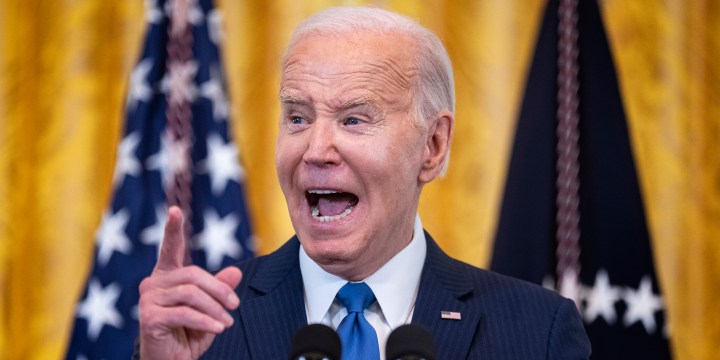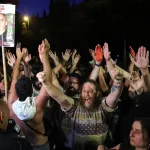MIDDLE EAST CRISIS UPDATE: 19 MARCH 2024
Biden warns Netanyahu over Rafah attack; famine imminent in northern Gaza, UN warns

US President Joe Biden warned Israeli Prime Minister Benjamin Netanyahu a major ground operation in Rafah would be a mistake. The two agreed to hold talks in Washington, DC, about Israel’s war plans in the coming days.
The possibility of a famine looms over northern Gaza as half the population of the area already faces ‘crisis levels of food insecurity or worse’, the United Nations warned.
Israel’s military made its deepest incursion into Gaza City in about two weeks, saying its troops were undertaking a “precise operation” targeting the main hospital in the northern metropolis that bore the brunt of the first weeks of fighting in the conflict.
Biden warns Netanyahu over Rafah attack
US President Joe Biden warned Israeli Prime Minister Benjamin Netanyahu that a major ground operation in Rafah would be a mistake. The two agreed to hold talks in Washington, DC, about Israel’s war plans in the coming days.
US National Security Advisor Jake Sullivan said Biden asked Netanyahu to send a team of military, intelligence and humanitarian officials to Washington to discuss Israel’s planning for Rafah and to lay out an alternative approach that would target Hamas and secure the Egypt-Gaza border without a full-scale invasion. Sullivan said the meeting could take place by week’s end.
“A major ground operation there would be a mistake. It would lead to more innocent civilian deaths, worsen the already dire humanitarian crisis, deepen the anarchy in Gaza and further isolate Israel internationally,” Sullivan told reporters on Monday at the White House.
He said Netanyahu had agreed to the request for a meeting. The US expected that Israel would hold off on any ground campaign in Rafah until the discussion took place, Sullivan said.
“There are ways for Israel to prevail in this conflict, to secure its long-term future, to end the terror threat from Gaza and not smash into Rafah,” he said.
The call earlier on Monday between Biden and Netanyahu was the president and prime minister’s first since 15 February. In the last month, the rift between both men has widened over Israel’s military campaign against Hamas and the increasingly dire humanitarian crisis in Gaza.
Last Friday Biden praised Senate Majority Leader Chuck Schumer’s call for new elections in Israel and Netanyahu’s ouster as a “good speech” that “expressed serious concern” shared by “many Americans”. Netanyahu responded on Sunday by calling Schumer’s comments “inappropriate” interference in Israel’s domestic affairs.
Asked if Schumer’s comments came up in the call, Sullivan said that the prime minister raised “concerns about a variety of things that have come out in the American press”, but declined to elaborate.
The Israeli leader also pledged he would press on with his operation against Hamas, which is considered a terrorist group by the US and European Union, into the southern city of Rafah where more than one million displaced Palestinians have fled, despite growing international pressure for a ceasefire.
Biden was caught on a hot microphone after his State of the Union address telling a senator he needed to have a “come to Jesus meeting” with Netanyahu about the situation in Gaza. US officials have said they would not support a Rafah offensive unless Israel produced a viable plan for evacuating civilians. White House spokesperson John Kirby said the administration had not seen such plans as of last Friday.
Famine is imminent in northern Gaza, UN-backed report warns
The possibility of a famine looms over northern Gaza as half the population of the area already faces “crisis levels of food insecurity or worse,” the United Nations warned.
Some 1.1 million people in Gaza — half of the population — had completely exhausted their food supplies and coping capacities and were struggling with catastrophic hunger, the World Food Programme said in a statement on Monday. Acute malnutrition in the war-torn region had stood at less than 1% before the recent fighting between Hamas and Israel erupted.
“People in Gaza are starving to death right now. The speed at which this manmade hunger and malnutrition crisis has ripped through Gaza is terrifying,” said WFP Executive Director Cindy McCain. “There is a very small window left to prevent an outright famine and to do that we need immediate and full access to the north.”
Israeli forces first entered Gaza in retaliation for Hamas’s 7 October attack that killed 1,200 people and led to more than 200 people being taken hostage. The health ministry in the Hamas-run territory says more than 31,000 Palestinians have died in the conflict.
The report, backed by other UN agencies and international aid groups including Unicef, the Food and Agriculture Organization of the UN and the World Bank, cites the Integrated Food Security Phase Classification (IPC) system to count the number of people facing “catastrophic hunger” and starvation.
The IPC scale is a globally recognised system to categorise food security levels in a population.
The famine — even in northern Gaza — could be stemmed if aid agencies were allowed access to provide food, water, nutrition products, medicines, health and sanitation services, at scale, to the entire civilian population, the report added. “For this to be possible, a humanitarian ceasefire is necessary.”
The WFP estimates that even addressing the basic food needs will require at least 300 trucks to enter Gaza every day and distribute food, especially in the north. Since the start of the year, it has managed only nine convoys to the north. Israeli and Hamas officials have failed to come to a ceasefire agreement, adding to the difficulty of getting aid into the area.
Israel has been facing mounting global pressure to allow more aid into the Gaza Strip, with Biden directing the US military to establish a temporary port on the coast to ease the humanitarian crisis.
On Monday, European Union foreign policy chief Josep Borrell and crisis commissioner Janez Lenarcic called the report the “worst possible forecast for Gaza”.
“Over 30,000 people have already died due to the conflict, a large part of them children, and the death toll could rapidly increase due to starvation or diseases. There is an absolute imperative to act now.”
Israel says its on-the-ground assessments differ from the UN’s and that while there are major problems with food distribution, there’s no widespread starvation in any part of Gaza.
Colonel Elad Goren, who works in the section of the Israeli military focused on civilian needs in Gaza and the West Bank, said at a briefing last Thursday, “In terms of the situation on the ground today, access to food remains stable in the south and centre of Gaza Strip. There is also food making its way to the north. However, we would like to see more distribution there.”
Israeli troops target Gaza City hospital, citing Hamas activity
Israel’s military made its deepest incursion into Gaza City in about two weeks, saying its troops were undertaking a “precise operation” targeting the main hospital in the northern metropolis that bore the brunt of the first weeks of fighting in the conflict.
Monday’s raid at Al-Shifa hospital, which has been largely dysfunctional since November, came after intelligence emerged “indicating the use of the hospital by senior Hamas terrorists to conduct and promote terrorist activity”, the military said in a statement.
The incursion comes about four months after Israeli troops completed a multiday operation at the hospital, where the military said it uncovered underground tunnels and military infrastructure for Gaza’s Hamas rulers.
While international focus has increasingly been on the possibility of a ceasefire and the situation in the southern city of Rafah, where Israel says the bulk of Hamas’s remaining forces are based, the raid in Gaza City shows how fighting continues across the narrow Gaza Strip.
Most of Gaza’s population of about 2.2 million are sheltering in and around Rafah, but an estimated 300,000 to 500,000 people remain in northern parts of the territory despite widespread destruction.
On Sunday, Netanyahu vowed in a Cabinet meeting to press on with Israel’s campaign against Hamas by sending troops into Rafah, despite mounting global pressure — including from the US — for a ceasefire. DM
Read more in Daily Maverick: Middle East crisis news hub




















 Become an Insider
Become an Insider
The coffee smell is getting stronger.